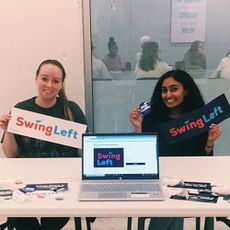

The Women's March on Washington and its sister marches around the world were among the most-attended protests in history. Women and men rallied to advocate for gender equality and fundamental human rights, and the combined voices of the estimated 3+ million who marched made a huge political statement.
But...now what? How can we carry the momentum forward? How can we move past the symbolic to the effective? How can we create actual, tangible change?
Start here. Right now.
A post shared by Women's March (@womensmarch)
A photo posted by on
The organizers of the Women's March on Washington are making it easy for supporters to find their next step with their new campaign, 10 Actions for the First 100 Days. Sign up for updates and receive a new, actionable goal every 10 days for the first 100 days of Donald Trump's presidency. The first action is a postcard-writing campaign to U.S. Senators.
2. Support progressives in swing districts.
A post shared by Swing Left (@swingleft)
A photo posted by on
SwingLeft is a site that aims to help Democrats take back the House in 2018. They're targeting "swing" districts—places where the last House of Representatives election was a tight race. While it will take more than the swing districts for Democrats to take control of the House, it's a great start for people looking to focus their time and effort where it can have the biggest impact. It's especially helpful for progressives who live in districts that typically go to Democrats.
3. Call your legislators.
Calling your legislators is one of the single most effective ways to make your voice heard and press for changes in Congress. Daily Action is striving to help by making "civic engagement easy and logistically painless." Sign up for text alerts and every day, Daily Action will send you an issue that needs to be urgently addressed where you live, and then connect you with your representative, senator, or other relevant official to do your civic duty. The best part? The whole process takes less than two minutes a day. No excuses.
4. Visit your legislators.
If you have more time to dedicate to your activism, consider scheduling an in-district lobby visit with your senator or representative. As CNN notes, organizations like the Human Rights Campaign encourage people to exercise their right to request face-to-face time with their legislators to discuss the issues that matter to them.
Stay In The Know
Marie Claire email subscribers get intel on fashion and beauty trends, hot-off-the-press celebrity news, and more. Sign up here.
5. Run for something—or help other progressives run.
In the wake of the 2016 election, Democrats are looking to build a strong bench for the future of the party. That means finding young progressives to run at the local level to both enact change and gain the experience they'll need to succeed in national elections in the future.
Organizations like Run for Something are mobilizing to help young progressives run for office. Groups like Emily's List, Emerge America, and Ignite focus specifically on women, while the Gay & Lesbian Victory Fund focuses on the LGBT community and the New American Leaders Project focuses on immigrant communities. Even if you're not interested in running yourself, you can donate time and money to help other likeminded young women take the leap.
6. Donate or volunteer to causes you care about.
Staying involved after the march doesn't have to be directly political. You can also donate your time to help organizations that need support now more than ever, like local branches of Planned Parenthood and the ACLU. If you're looking for organizations to support, the Women's March partners page is a great place to start.
7. Organize an event in your area.
If you're having trouble finding a way to keep fighting in your hometown, consider taking the initiative to plan an event of your own. As we learned in such a big way from the Women's Marches, in-person events and rallies are key to energizing people to take action, and action is exactly what we need right now.
You can plan something entirely on your own or turn to larger organizations for inspiration. "The resistance doesn't stop with a march or a protest in D.C., and we want to keep the drumbeat going and the pressure on from all sides and states," Generation Progress Action spokesman Kyle Epstein said, according to CNN.
Follow Marie Claire on Facebook for the latest celeb news, beauty tips, fascinating reads, livestream video, and more.

Kayleigh Roberts is a freelance writer and editor with more than 10 years of professional experience. Her byline has appeared in Marie Claire, Cosmopolitan, ELLE, Harper’s Bazaar, The Atlantic, Allure, Entertainment Weekly, MTV, Bustle, Refinery29, Girls’ Life Magazine, Just Jared, and Tiger Beat, among other publications. She's a graduate of the Medill School of Journalism at Northwestern University.
-
 Jennifer Lopez Clearly Prefers This Comeback Sneaker Trend
Jennifer Lopez Clearly Prefers This Comeback Sneaker TrendShe's wearing it as often as her favorite Birkin bags.
By Julia Gray Published
-
 Olivia Rodrigo Is Bringing Visible Bra Straps Back
Olivia Rodrigo Is Bringing Visible Bra Straps BackThe pop-punk princess wore custom Victoria's Secret at Coachella.
By Julia Gray Published
-
 Meghan Markle’s New Netflix Cookery Show Begins Filming Today—But Not Where You’d Expect It to Be Shot
Meghan Markle’s New Netflix Cookery Show Begins Filming Today—But Not Where You’d Expect It to Be ShotThe Sussexes are having a busy week this week, shooting both of their his-and-her Netflix shows and rolling out the first product offering for Meghan’s new lifestyle brand American Riviera Orchard.
By Rachel Burchfield Published
-
 36 Ways Women Still Aren't Equal to Men
36 Ways Women Still Aren't Equal to MenIt's just one of the many ways women still aren't equal to men.
By Brooke Knappenberger Last updated
-
 How New York's First Female Governor Plans to Fight for Women If Reelected
How New York's First Female Governor Plans to Fight for Women If ReelectedKathy Hochul twice came to power because men resigned amid sexual harassment scandals. Here, how she's leading differently.
By Emily Tisch Sussman Last updated
-
 Why the 2022 Midterm Elections Are So Critical
Why the 2022 Midterm Elections Are So CriticalAs we blaze through a highly charged midterm election season, Swing Left Executive Director Yasmin Radjy highlights rising stars who are fighting for women’s rights.
By Tanya Benedicto Klich Published
-
 Tammy Duckworth: 'I’m Mad as Hell' About the Lack of Federal Action on Gun Safety
Tammy Duckworth: 'I’m Mad as Hell' About the Lack of Federal Action on Gun SafetyThe Illinois Senator won't let the memory of the Highland Park shooting just fade away.
By Sen. Tammy Duckworth Published
-
 Roe Is Gone. We Have to Keep Fighting.
Roe Is Gone. We Have to Keep Fighting.Democracy always offers a path forward even when we feel thrust into the past.
By Beth Silvers and Sarah Stewart Holland, hosts of Pantsuit Politics Podcast Published
-
 The Supreme Court's Mississippi Abortion Rights Case: What to Know
The Supreme Court's Mississippi Abortion Rights Case: What to KnowThe case could threaten Roe v. Wade.
By Megan DiTrolio Published
-
 Sex Trafficking Victims Are Being Punished. A New Law Could Change That.
Sex Trafficking Victims Are Being Punished. A New Law Could Change That.Victims of sexual abuse are quietly criminalized. Sara's Law protects kids that fight back.
By Dr. Devin J. Buckley and Erin Regan Published
-
 My Family and I Live in Navajo Nation. We Don't Have Access to Clean Running Water
My Family and I Live in Navajo Nation. We Don't Have Access to Clean Running Water"They say that the United States is one of the wealthiest countries in the world. Why are citizens still living with no access to clean water?"
By Amanda L. As Told To Rachel Epstein Published